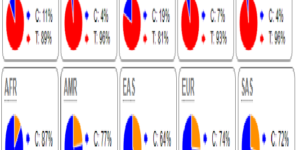Chetty K, Khathi A, Schneider S, et al. Type 2 diabetes mellitus serum biomarker levels and associated single nucleotide polymorphisms in a South African population. Series Endo Diab Met. 2023;5(3):100-118.
Type 2 diabetes mellitus (T2DM) is a metabolic disorder with multiple causes. The prevalence of T2DM is on the rise, however, on the African continent, nearly 70% of all T2DM cases go undiagnosed. T2DM places a great burden on the already stretched healthcare systems. Current tests do not provide predictive measures in terms of the possible onset of the disease. Biomarker and gene analysis have been used to predict the onset of the disease, but this has seen very limited use in the African population groups. Identification of variances in biomarkers and subsequent genetic aberrations at early diagnosis could enable clinical focus on patients more likely to develop insulin resistance. The aim of the study was to compare T2DM-associated biomarker levels between T2DM patients and non-T2DM participants and identify genetic variances in single nucleotide polymorphisms (SNPs) associated with the biomarkers. Two cohorts (n = 78) were screened for associated biomarkers using a commercially available enzyme-linked immunosorbent assay (ELISA) kit. The results of this analysis were used to select SNPs in genes associated with the screened biomarkers. The molecular genotyping was completed using quantitative polymerase chain reaction (qPCR) assays. The biomarker analysis revealed significant statistical differences between four of the ten screened biomarkers: Glucose-dependent insulinotropic polypeptide (GIP) (p = 0.0004), resistin (p = 0.0398), visfatin (p = 0.0009), and glucagon (p = 0.0034). The SNPs selected for molecular genotyping were rs6235 in proprotein convertase subtilisin/kexin type 1 (PCSK1) and rs2208203 in proprotein convertase subtilisin/kexin type 2 (PCSK2). Both these genes are involved in the biosynthesis of various biomarkers that were screened. The results from the molecular genotyping failed to show any significant difference between the control and T2DM case groups. While some biomarkers were shown to have significant statistical differences between the two study cohorts, more work needs to be conducted to understand the role of each biomarker in T2DM.
Article DOI: 10.54178/jsedmv5i3001

